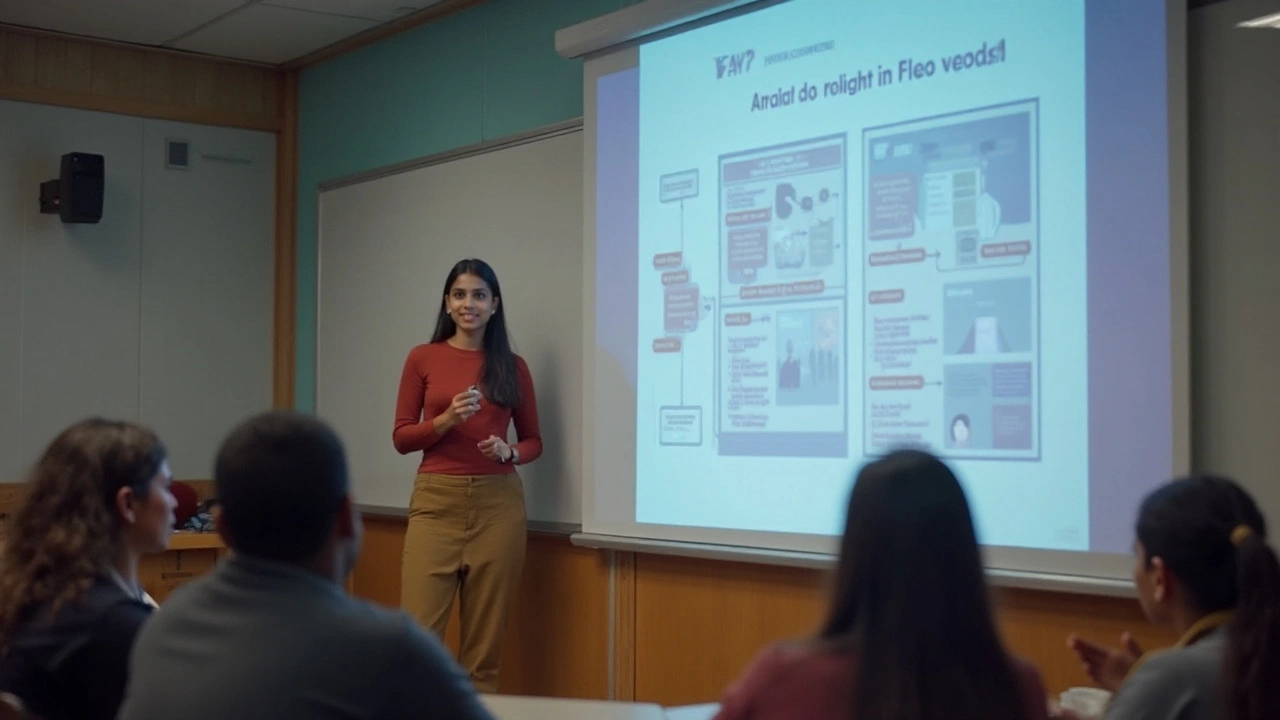In recent years, the educational journey of countless individuals in India has taken a distinctive turn toward certificate courses. These concise programs, crafted with the intent to impart practical knowledge, are becoming increasingly appealing in the context of evolving job market demands. Certificate courses are often designed by industry experts, focusing on up-to-date skills that are both relevant and readily applicable.
The allure of these courses lies in their brevity and specificity. Most certificate programs allow professionals to hone skills without the commitment of a long-term course. This flexibility often works in favor of those who are either looking to transition into a new field or enhance their expertise in their current profession. Contrary to traditional degrees, they offer direct engagement with the skills that industries are seeking.
The sectors where certificate courses shine the brightest include technology, finance, digital marketing, and health sciences. With the rapid technological evolution and globalization, industries tend to place immense value on candidates equipped with specific skills rather than mere academic qualifications.
- Rising Demand for Certificate Courses
- Skills Over Degrees: Industry Needs
- Popular Sectors for Certification
- Choosing the Right Certificate Program
- Future of Certification in Indian Education
Rising Demand for Certificate Courses
The significance of certificate courses in India's educational narrative has surged remarkably in recent years. This rise is not merely a trend but a reflection of shifting perspectives toward learning and professional skill acquisition. The traditional emphasis on degrees is gradually giving way to specialized training that can be completed in a fraction of the time. This shift is primarily fuelled by the dynamic nature of industries and their constant quest for innovation and efficiency. For companies in high-growth sectors, such as IT and digital marketing, skills and productivity often trump academic credentials. Consequently, the demand for courses that quickly equip individuals with job-ready skills has reached new heights.
While some skeptics might view certificate courses as less prestigious, their value becomes evident in a job market that is increasingly prioritizing practical over theoretical knowledge. Many students and professionals alike are opting for these programs, given their focused approach. Moreover, these courses often involve partnerships with leading industry players, ensuring that the curriculum remains relevant. The swift completion time of these programs is another attractive feature, allowing learners to upskill or reskill without long breaks in their professional careers.
An interesting case in point is the swelling enrollment numbers reported by platforms like Coursera and edX. These platforms partner with renowned universities and companies, offering courses that are widely recognized and respected in the professional sphere. The trend extends beyond the digital realm. Institutes within India, such as NIIT and the Indian School of Business, have also crafted certificate programs tailored to today's needs. They seamlessly blend theoretical knowledge with practical training to prepare learners for current industry challenges.
In a report by LinkedIn, it was highlighted that "60% of job seekers said that job-specific skills and competencies are increasingly essential for securing employment," illuminating the tangible importance of skills over just paper qualifications.
One compelling benefit of such courses is the potential return on investment. While traditional degrees can lead to substantial debt, many certificate programs are affordably priced, providing access to quality education without financial strain. This cost-effectiveness makes them accessible to a broader section of the population, thus encouraging diversity and inclusion in the workplace. Additionally, companies are now incentivizing further education by funding their employees' enrollments in these programs. It's clear why the demand for certificate courses continues to rise; they offer a pragmatic approach to education in a world where agility and skill adaptability are key.
Skills Over Degrees: Industry Needs
In today's competitive job market, the emphasis is increasingly shifting towards skills over formal degrees. This change is particularly prominent in India where industries demand real-world capabilities that these concise certificate courses are designed to deliver. Traditional education systems, though valuable, often fail to keep pace with the rapid technological changes and evolving industry requirements. Many companies now value a candidate's skill set more than their formal educational credentials. This trend is evident particularly in the IT sector, where technology evolves at breakneck speed and the need for specific technical skills is constantly changing.
Software companies, for instance, prefer hiring individuals who possess practical expertise in the latest programming languages or software development frameworks. A degree might suggest a broad understanding of computer science, but it might not guarantee proficiency in newly developed tools or technologies. Companies like Google and IBM have begun to acknowledge this shift by removing degree requirements altogether for some of their roles, focusing instead on the applicable skills the candidate can bring to the table.
This transition is not just restricted to the tech field. In the financial sector, there is a growing emphasis on certifications like Chartered Financial Analyst (CFA) or Certified Financial Planner (CFP), which provide a deeper understanding of financial trends and investment strategies, equipping professionals with the ability to analyze and anticipate market movements effectively. The healthcare industry also sees value in certifications for medical coding and health information management, especially as the field grows more data-driven.
"What we're seeing is a move away from pedigree and towards proven ability," says Ira Glass, a renowned education analyst. "The skill that a person brings can sometimes tell more than their academic qualifications."
Companies value individuals who demonstrate their learning agility, motivation, and adaptability—traits often nurtured through skill-based learning. This emphasis on tangible skills development creates an environment where individuals can continuously upgrade their abilities to align with the current demands of various industries. This can be particularly beneficial to professionals in dynamic fields like digital marketing, which frequently requires staying ahead with skills in search engine optimization (SEO), social media marketing, and pay-per-click (PPC) strategies.
For aspirants looking to bridge the gap effectively between what they know and what the industry needs, certificate courses serve as a viable option. They allow professionals to stay relevant and competitive by offering specialized knowledge on current practices and tools, which are sometimes absent in traditional degree curricula. This skill-centric approach not only enhances employability but also allows for significant career progress by adapting to new job roles and industries—ultimately showing that skills can indeed sometimes outweigh degrees in the modern job landscape.

Popular Sectors for Certification
In the contemporary educational spectrum of India, several sectors are emerging as frontrunners for certificate courses. One such dominant field is technology, which constantly craves advanced expertise due to its dynamic nature. The technology sector offers certificates in areas like data science, artificial intelligence, and blockchain technology. These certificates are not merely academic; they provide hands-on experience, enabling learners to tackle real-world challenges. With tech giants and startups alike seeking individuals with cutting-edge competencies, such qualifications allow one to stand apart in an increasingly competitive job market.
Finance is another area where certificate courses are gaining immense traction. From financial planning to investment management, these programs offer precision training that meets the needs of the financial landscape. Notably, certifications such as Chartered Financial Analyst (CFA) and Certified Financial Planner (CFP) are widely respected. They provide in-depth understanding, letting aspirants navigate complex financial tools and concepts. Given the intricate nature of global financial systems today, having these specific skills is indispensable. Recruiters often prioritize certified professionals as they bring validated expertise to the table.
Healthcare remains a sector where certifications hold substantial value. With advancements in medical technology and practices, healthcare professions are continually evolving. There are courses dedicated to certifications like phlebotomy, clinical research, and healthcare management. These training modules cater to the demands for specialized medical knowledge, regardless of whether it's for clinical roles or administrative positions. In a report by India's Ministry of Health, there's a projected need for millions of healthcare workers, and certifications can help bridge this gap by providing qualified professionals quickly.
Digital marketing stands out as a modern career path where certifications can significantly enhance prospects. Certificates for SEO, content marketing, and social media management help professionals craft data-driven strategies. With the digital economy booming, brands and businesses are in constant search for marketers who can engage effectively with audiences online. As digital marketing methodologies evolve, ongoing education through certification ensures professionals stay up-to-date with the latest trends and tools. According to a survey by Pearson, nearly 70% of employers view certified professionals as more competent.
"The role of certification in today’s fast-paced employment environment is increasingly critical. It serves as a hallmark of expertise and a bridge to continuing professional development," says a report by the World Economic Forum.
Finally, sectors like logistics and supply chain management have also witnessed an upswing in the demand for certificate courses. With global trade and e-commerce expanding, efficient supply chain solutions are vital. Certifications in this domain teach candidates about logistics planning and implementation, supply chain analytics, and strategic management. Enterprises seek out individuals who can ensure seamless operations, and such certifications validate a candidate’s skills in maintaining the flow of goods and information.
Choosing the Right Certificate Program
Deciding on a certificate course can be a pivotal step in your career trajectory, especially in a vibrant educational landscape like India. With an abundant array of certificate courses available, selecting the right one demands careful consideration and foresight. Several factors should be taken into account to ensure that you are investing your time and resources wisely.
First, it's essential to align the course with your career goals. Ask yourself how this specific certification might propel your career forward. Does it fill a gap in your skillset? Is it recognized by employers in the industry you aim to penetrate or progress in? By answering these questions, you can narrow down your options to those programs that provide value relative to your professional aspirations.
Accreditation is another critical factor. Ensure that the institution offering the credential is reputable, as the certificate's value largely depends on its issuer's credibility. For certain fields, industry partnerships or collaborations can significantly add weight to a certificate, making it more attractive to employers. You may want to read reviews or testimonials from previous students, which can offer insightful perspectives on the course content and its applicability in real-life scenarios.
Another aspect to ponder over is the modality of delivery. Many certificate programs in India offer flexible learning options, from fully online courses to hybrid models, accommodating diverse learning styles and schedules. If you're currently employed or managing other commitments, a flexible schedule can be a deciding factor for success. Balancing a training course with other responsibilities requires careful planning, and ensuring the learning mode suits your personal circumstances can enhance your experience and reduce stress.
Your budget is also significant in the decision-making process. Certification costs can vary drastically, so calculate the potential return on investment. Will this program lead to a salary increase, a more satisfying job position, or simply better job security? Financial aids or scholarships might be available to ease the economic burden, depending on the rations each institution offers.
Lastly, stay informed about the latest industry trends and demands. Technology-driven fields often require staying up-to-date with trends, and choosing a program that incorporates current developments can make a substantial difference. As renowned academic and career advisor, Dr. Sejal Patel, notes,
"The right certification is like a bridge, connecting you swiftly and securely to a myriad of possibilities and pathways."This insight reinforces the necessity of diligent research and wise decision-making when embarking on this educational venture.

Future of Certification in Indian Education
As we step into an era driven by technology and rapid innovation, the future of certificate courses in India's educational framework appears exceptionally promising. The rise of digital platforms affirms the transformative role they will play in reshaping how knowledge and skills are acquired. With the increasing demand for a skilled workforce, there is a notable shift from traditional degree programs to specialized learning, a shift enthusiastically embraced by both educational institutes and industry leaders. A focus has emerged on crafting programs aligned with the needs of the modern economy, ensuring that learning is not just theoretical but directly applicable.
One of the most promising advancements in this realm is the growing collaboration between educational organizations and industries. These partnerships ensure that content is curated with hands-on experience in mind, offering students not only the knowledge but also the application needed in real-world scenarios. An interesting development is the enhanced use of technology, offering remote access to high-quality education resources. Institutes are now investing in online platforms that allow students from various regions to partake in courses that were previously inaccessible to them.
Within this dynamic landscape, several platforms are setting benchmarks by offering cutting-edge training programs. The surge in education technology (ed-tech) companies has democratized learning, reaching a wide audience through user-friendly interfaces. As these programs continue to gain credibility, more companies are beginning to recognize them as a viable learning path, leading to higher employability for those who enroll. The ability to upskill rapidly through these courses enables workers to stay relevant amidst ever-changing industrial demands. "Skill development is the new currency in today's job market," states a spokesperson from a leading ed-tech firm, highlighting this critical shift.
Projected growth within sectors that value certifications more than traditional education is significant. Fields such as information technology, healthcare, finance, and digital marketing are especially ripe for this new educational model. A younger workforce seeks nimbleness, and the avenue of certification courses offers just that. The content, design, and delivery methods of these courses are molded to meet contemporary standards, ensuring students are ready to navigate complexities right from the start.
Despite challenges, such as ensuring the credibility and authenticity of these courses, the Indian government and educational bodies are focusing on establishing frameworks that regulate and standardize offerings. By doing so, they can maintain the quality and legitimacy of certifications. As policies evolve, we can expect more support for these alternative educational paths, which are not only economically feasible but also highly effective in nurturing a skilled populace.
In a society where the perception of education is gradually shifting, certificate courses in India stand at the forefront of innovation, paving the way for an adaptive and resilient learning ecosystem. With continuous advancements and acceptance, they are undoubtedly set to become a cornerstone of the country's educational infrastructure.



